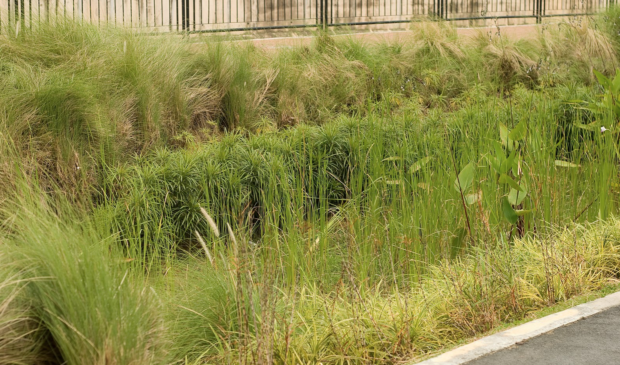New water quality rules aim to promote green infrastructure
Wednesday, August 10, 2022 by
Jonathan Lee In a presentation to the Environmental Commission last Wednesday, staffers from the Watershed Protection Department presented a bundle of code updates aimed at improving water quality and making drainage infrastructure more environmentally friendly.
“We couldn’t be more excited about the potential impact of these updates on the future of Austin’s environmental resilience,” Environmental Officer Katie Coyne told the commission.
One of the more significant updates will require green stormwater infrastructure in many new developments – things like rain gardens, biofiltration ponds and rainwater capture systems.
Staffers say these elements are better than typical concrete stormwater infrastructure. In addition to managing flooding, they provide “ecosystem services, improved filtration, wildlife habitat, heat island mitigation, water conservation,” said Liz Johnston, environmental program coordinator.
Conventional stormwater systems “do very well what they’re designed to do, but they only do that one thing,” Johnston said, adding, “They’re just not inviting.”
Green stormwater infrastructure will be required for sites with less than 90 percent allowable impervious cover. Staffers may still allow conventional infrastructure, provided developers make a case for why green infrastructure won’t work for their project.
Where possible, surface parking lots will have to drain to pervious parking lot islands, landscaped medians or perimeter landscapes.
Another rule will require “functional green” landscaping for sites with more than 80 percent allowable impervious cover. Functional green, Johnston explained, “is a more ecosystem-based type of landscape code that has basically a list of elements that a project can choose from in order to achieve a sufficient number of points.”
Run-of-the-mill landscaping like trees and shrubs qualify, as do more elaborate elements like rain gardens, porous pavement and vegetated roofs.
Several other changes are also proposed. Details can be found in the staffers’ presentation.
Commissioners wondered how the new rules might affect the cost of housing.
“It’s obviously a delicate dance between providing the most oversight and protection as possible and also prioritizing affordable housing, especially multifamily housing,” Commissioner Haris Qureshi said. “Sometimes situations that are supposed to be win-win can end up feeling like a lose-lose, and it’s all of our job to try to minimize that as much as possible.”
Staffers plan to release an affordability impact statement for the regulations.
With affordability in mind, staffers recommend exempting “missing middle” housing projects with up to 11 units on single-family lots from lengthy site plan review for water quality and drainage. Few projects, however, stand to benefit because most single-family lots only allow two units. “It’s probably right now a fairly limited number of sites that have the zoning that would allow (missing middle) to occur,” Johnston said.
Most of the code changes were originally part of the failed Land Development Code rewrite. Council decided to revive this piece of rewrite in a resolution passed June 9.
The Environmental Commission will vote on whether to recommend the new regulations at its Sept. 7 meeting. City Council will then decide whether to adopt the changes into code. “If the stars align, we’ll be at City Council Sept. 29,” Johnston said.
Photo made available through a Creative Commons license.
The Austin Monitor’s work is made possible by donations from the community. Though our reporting covers donors from time to time, we are careful to keep business and editorial efforts separate while maintaining transparency. A complete list of donors is available here, and our code of ethics is explained here.
You're a community leader
And we’re honored you look to us for serious, in-depth news. You know a strong community needs local and dedicated watchdog reporting. We’re here for you and that won’t change. Now will you take the powerful next step and support our nonprofit news organization?










